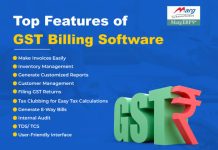Introduction
The Goods and Services Tax (GST) is a comprehensive indirect tax that was introduced in India on July 1, 2017, with the aim of simplifying the complex tax structure and bringing uniformity in the taxation system across the country. Jammu and Kashmir, as a Union Territory, also follows the GST regime like the rest of India. In this blog, we will delve into the details of GST billing in Jammu and Kashmir, including the applicable rates, invoicing requirements, and other key aspects.
Overview of GST Rates in Jammu and Kashmir
Under the GST regime, different goods and services are categorized into various tax slabs, which are based on their nature, usage, and other factors. In Jammu and Kashmir, the GST rates applicable for goods and services are the same as those in the rest of India. The GST rates in Jammu and Kashmir are broadly classified into four slabs:
- 5% – This slab includes essential items such as food grains, pulses, milk, vegetables, and fruits.
- 12% – This slab includes items like frozen meat products, butter, cheese, ghee, mobile phones, and medical equipment.
- 18% – This slab includes items like fabric, footwear, furniture, cement, and luxury goods.
- 28% – This slab includes items like tobacco, pan masala, aerated drinks, and luxury cars.
It’s important to note that there are certain goods and services that are exempted from GST or are taxed at a concessional rate in Jammu and Kashmir, such as unprocessed food items, education, healthcare services, and public transportation.
Invoicing Requirements under GST in Jammu and Kashmir
Invoicing is a crucial aspect of GST compliance, and it is important to ensure that the invoices are issued in accordance with the prescribed rules and regulations. In Jammu and Kashmir, the invoicing requirements under GST are similar to those in the rest of India. Here are some key points to keep in mind:
- Mandatory details in an invoice: An invoice issued under GST in Jammu and Kashmir must contain various mandatory details, including the name, address, and GSTIN (Goods and Services Tax Identification Number) of the supplier and recipient, description of goods or services, quantity, value, and applicable GST rates, along with the amount of GST charged.
- Invoice format: As per the GST rules, invoices must be issued in a specific format, which includes serial numbers, date of issue, and other relevant details. In Jammu and Kashmir, the format of the invoice is the same as the format prescribed under the GST law in the rest of India.
- Bill of Supply: In certain cases where GST is not applicable, such as when the supplier is registered under the composition scheme or when the transaction falls under the reverse charge mechanism, a “Bill of Supply” needs to be issued instead of a regular invoice. The format of the Bill of Supply is also prescribed under the GST law and must be followed in Jammu and Kashmir.
- Time of supply: The time of supply, which determines the point at which GST becomes payable, is an important aspect of invoicing. In Jammu and Kashmir, the time of supply rules under GST are the same as those in the rest of India and must be complied with while issuing invoices.
Input Tax Credit (ITC) in Jammu and Kashmir
Input Tax Credit (ITC) is a mechanism under GST that allows businesses to set off the GST paid on their purchases against the GST liability on their sales. In Jammu and Kashmir, the ITC provisions are similar to those in the rest of India. Here are some key points to understand about ITC in Jammu and Kashmir:
- Eligibility for ITC: In order to claim ITC, a business in Jammu and Kashmir must be registered under GST and the goods or services for which ITC is being claimed must have been used for business purposes. The supplier must have also deposited the GST charged on the invoice to the government.
- Documents required for claiming ITC: To claim ITC, a registered business in Jammu and Kashmir must possess a valid tax invoice or a debit note issued by the supplier, which contains the necessary details as per the GST law. The business must also have a copy of the supplier’s GSTIN and the GSTIN of the recipient.
- Conditions for claiming ITC: There are certain conditions that must be met for claiming ITC in Jammu and Kashmir. For example, the recipient must have received the goods or services, and the tax invoice or debit note must have been uploaded by the supplier on the GST portal. The recipient must also have filed their GST returns and the supplier must have paid the GST to the government.
- Blocked credits: Not all input taxes are eligible for ITC. There are certain inputs on which ITC cannot be claimed, known as blocked credits. In Jammu and Kashmir, the blocked credits are the same as those in the rest of India, such as motor vehicles, food and beverages, and works contract services for immovable property.
Other Important Aspects of GST Billing in Jammu and Kashmir
Apart from the basic invoicing requirements and ITC provisions, there are other important aspects of GST billing in Jammu and Kashmir that businesses must be aware of. Here are some key points:
- E-way bill: The E-way bill is a document that needs to be generated for the movement of goods worth over a certain threshold value. In Jammu and Kashmir, businesses must comply with the E-way bill requirements as per the GST law, which are similar to those in the rest of India.
- HSN codes: The Harmonized System of Nomenclature (HSN) codes are used to classify goods under GST. Businesses in Jammu and Kashmir must mention the appropriate HSN codes in their invoices as per the prescribed rules, which are in line with the HSN codes used in the rest of India.
- Tax invoice for reverse charge mechanism: In certain cases where the recipient is liable to pay GST under the reverse charge mechanism, the tax invoice must mention that the tax is payable on reverse charge basis. This requirement must be fulfilled in Jammu and Kashmir as per the GST law.
- Record keeping: Businesses in Jammu and Kashmir, like in the rest of India, must maintain proper records of all invoices, bills of supply, and other documents related to GST for at least 6 years. These records must be readily available for inspection by the GST authorities.
Conclusion
In conclusion, GST billing in Jammu and Kashmir follows the same principles and guidelines as the rest of India. It is important for businesses to understand the applicable GST rates, invoicing requirements, ITC provisions, and other aspects to ensure compliance with the GST law. Proper record keeping and adherence to the GST rules are essential for businesses in Jammu and Kashmir to avoid any penalties or fines. Stay updated with the latest GST regulations and seek professional advice if needed to ensure smooth and compliant billing practices under the GST regime in Jammu and Kashmir.
Read more useful content:








